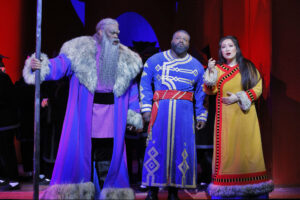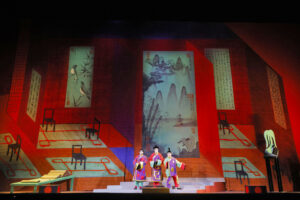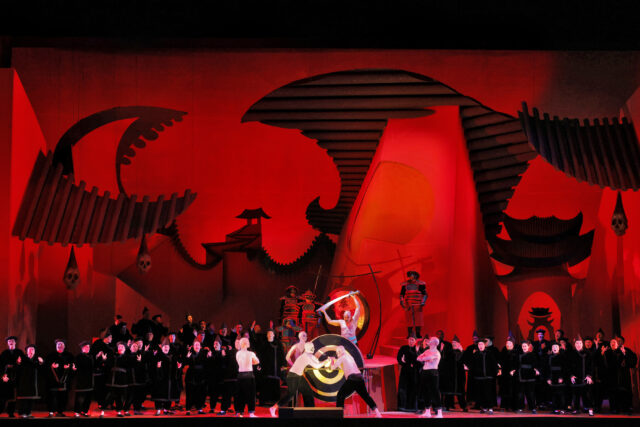David Hockney’s scenic design takes Giacomo Puccini’s classic opera to the next level of excellence by transforming it into a visual extravaganza to match the music.
By John Lavitt
Los Angeles, CA (The Hollywood Times) 05-22-2024
Giacomo Puccini’s Turandot is a visual and auditory feast at the Dorothy Chandler Pavilion. Conducted by Music Director James Conlon, the new-to-Los Angeles production is so impressive because it features stage designs by legendary British artist David Hockney. Long associated with the pools and villas of Southern California, Hockney applies his visual palette to Puccini’s classic, if slightly controversial, dive into what is described today as Orientalism.
Set in legendary China, the opera offers a Westernized view of Chinese culture that feels like cultural appropriation. Written by Puccini in 1924, near the time of his death, the opera reflects the period of its creation. It is a product of its time.
Setting aside the controversy, the opera is a resounding success. The LA Opera’s decision to give David Hockney free rein to realize Puccini’s original vision has paid off, creating a production where the visuals are as captivating as the sounds. As LA Opera’s president and CEO Christopher Koelsch eagerly shares, “I’ve been looking forward to this production for many years. David Hockney has been part of the LA Opera family since the company’s earliest seasons… It is a special delight to now present, for the first time in Los Angeles, his astonishingly beautiful production of Turandot.”
Indeed, with sweeping colors influenced by Asian scroll painting, David Hockney’s scenic design is vivid and geometrically complex. Directed by Garnett Bruce, the shapes of the sets enhance the color play, bringing forth shadows that complement that dark storyline. Both choreographer Kitty McNamee and fight and intimacy director Andrew Kenneth Moss take full advantage of Hockney’s complex geometries, allowing the actors to flow through the settings.

Soprano Angela Meade sings the demanding title role of Princess Turandot, with tenor Russell Thomas (LA Opera’s Resident Artist) playing Calaf, the prince who longs to win her love. With strong, imposing presences, both performers are equal to the task. However, watching the storyline, one wishes Calaf would fall in love with Liu (soprano Guanqun Yu), the beautiful and kindly enslaved person who tends to his beleaguered father, Timur (bass Morris Robinson). The compassion of Liu is the most potent and authentic emotion in the production. Together, Liu and Timur provide many of the finest acting moments in the show.
Finally, there is a need to address the question of Orientalism. As the renowned scholar Edward Said wrote in Orientalism, “Orientalism can be discussed and analyzed as the corporate institution for dealing with the Orient—dealing with it by making statements about it, authorizing views of it, describing it, by teaching it, settling it, ruling over it: in short, Orientalism as a Western style for dominating, restructuring, and having authority over the Orient.”
Thus, Orientalism is about domination, and Turandot is part of that discourse by presenting a vision of China wholly appropriated by Western society. Such domination is best expressed in the Three Stooges-like comedy of Ping, Pang, and Pong. Baritone Ryan Wolfe, a member of the Domingo-Colburn-Stein Young Artist Program, plays Ping, Julius Ahn plays Pong, and tenor Terrence Chin-Loy makes his company debut as Pang.

All three performers are excellent, and the problematic limitations are wholly textual. Even now, in light of David Hockney’s wonder reimagining Turandot‘s style and look, the question remains of whether such a show should still be produced. In the audience, the hijinks of Ping, Pang, and Pong were thoroughly enjoyable to watch. However, without any argument, they are cultural stereotypes of a problematic kind, and should such stereotypes continue to be presented. There is no easy answer to such questions, but they do need to be asked.
Overall, however, Turandot proved to be a sumptuous feast for the ears and the eyes from the beginning to the end. David Hockney’s set combines with James Conlon’s music to bring a new verve and dynamism to Giacomo Puccini’s final opera. Indeed, it is worth a second look.
Photos by Cory Weaver Courtesy of the LA Opera





